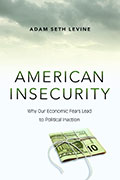New book finds economic fears lead to political inaction
By Linda B. Glaser

Why aren’t people who care deeply about issues like job loss, health care costs and college debt politically active on these issues? Why aren’t mobilization efforts more effective?
Cornell political scientist Adam Seth Levine lays out an answer to the puzzle in his new book, “American Insecurity: Why Our Economic Fears Lead to Political Inaction.” He examines the foundations of political behavior and offers a new perspective on barriers to political involvement on economic insecurity concerns.
“The discrepancy between the economic insecurity issues that people care about and their likelihood of taking action doesn’t exist on other issues that aren’t related to financial insecurity,” says Levine.
Levine’s key discovery is that rhetoric about economic insecurity issues is self-undermining: It brings to mind considerations that actually undermine the very purpose it’s trying to achieve, by reminding people about other things on which they presently have to spend money or could have to spend money in the future. The rhetoric about these issues actually reduces peoples’ willingness to spend money on a political donation on issues that deeply affect them, and if they’re in the labor force it reduces their willingness to spend time as well.
Self-undermining rhetoric can look like a lot of different things, says Levine. “Say you’re an organization trying to raise awareness about – and potentially raise money around – the issue of health care costs. If your rhetoric reminds people about the exorbitant and increasing costs of health care, and thus the increasing costs of their own health care and their own economic insecurity – and then in the same breath, or the same letter, you ask them to donate money to your organization – that would be self-undermining.”
In a number of different experiments, as well as in an examination of survey data, Levine discovered a significant divergence among people in and out of the labor force. Among those in the labor force, it turned out to be self-undermining to try to mobilize them to spend money or spend time on issues related to economic insecurity. Among people who aren’t in the labor force, trying to get them to spend money on an economic insecurity issue that personally affects them is self-undermining, but it is not self-undermining to ask them to spend time, since to this population time is not a limited resource.
This helps explain why organizations like the American Association of Retired Persons has an easier time, relative to other organizations, mobilizing people who are facing some kind of economic insecurity, says Levine.
“I’ve identified a barrier to collective political action that is uniquely communicative in nature, as it refers to what gets communicated when organizations and elites try to mobilize people based on economic insecurity concerns,” explains Levine.
Linda B. Glaser is a staff writer for the College of Arts and Sciences.
Media Contact
Get Cornell news delivered right to your inbox.
Subscribe